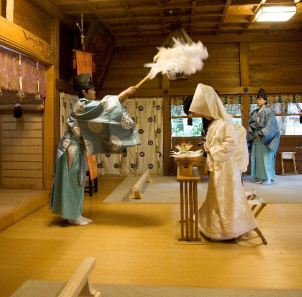“From the Lord comes deliverance. May your blessing be on your people.” Psalm 3:8

While sitting in the office of the local Shinto priest, my gaze fixed upon a placard on the wall which advertised (in Japanese) set charges for services rendered:
- ¥10,000 for a car blessing
- ¥5,000 for a school entrance exam blessing
- ¥10,000 for a baby blessing
- ¥15,000 for a new home blessing
- ¥10,000 for a marriage blessing
The whole concept stunned me on many levels and several questions came to mind as I chatted with my gracious host in a very unfamiliar setting. “How can mere mortal men place themselves in the position of dispensing blessings on behalf of the gods?” was something I asked myself. I did my best to politely nibble around the edges of this concept as I conversed with the Shinto priest. He explained, according to the Shinto religion, that nearly all objects, including both animate and inanimate, possess a spiritual essence known as kami (神). These kami are everywhere, but they are not regarded as omnipotent, omniscient, or even immortal. The term “Shinto” (神道) means literally “way of the kami” and they reportedly number over eight million. These spirits are duly venerated across Japan at various public shrines and private god shelves. It is believed by many adherents that kami have the power to dispense blessing on their devotees through rituals, good luck charms and designated intermediaries such as the priests.
As I sat in the office of the local priest, other questions continued to fill my mind such as: “How can one charge money for a blessing?” From my perspective, such a practice seemed to reduce religion to a mere business transaction. This thought led naturally to another related question, which was, “Why would people actually participate in such obvious duplicity?” Perhaps the explanation to this conundrum resides in the standard practice of Shinto religious ceremonial procedures, where devotees have a sense that they cannot approach the kami with a request without some form of ritual purification to remedy their unclean state. This rite of purification is called harae (祓) and it usually begins with a symbolic washing using water near the shrine entrance. The next phase in absolution is conveniently performed by the priest (for a fee!), who rhythmically waves a large paper shaker called an ōnusa (also referred to as a haraegushi) over the object or person to be purified and blessed. Only after these procedures are performed can one approach the kami and hope to have their request granted.
Lying at the heart of the many intricate rituals of Shintoism is the basic human desire to be blessed by something or someone greater than one’s self. We want a healthy baby, success on a test, protection from infectious diseases, safety on the road, a good paying job, and a happy marriage, but such objectives often elude us because they lie beyond our control. Therefore, we are tempted to turn to a higher power to obtain them. Fortunately for us, there is a Higher Power who graciously dispenses such blessings on His people (Psalm 3:8) despite our unclean condition. We are beckoned to approach this God to request such favors, not because of our worthiness or the intercession of others, but because of the forgiveness provided through the cross by His Only Son. No fee is charged; God has paid it all. A few years later, this same priest reached the same conclusion and turned to Jesus for eternal absolution.

What cultural insight breaking forth into the light of salvation by the power of the Gospel!
LikeLike
As I’ve always said Mike, you’re an excellent writer! Maybe you’ll put all these together in a book one day? !
Praising God for this priest’s salvation!
You guys doing alright? We sre fine here, and thanking God to have all our family together this year. We know how you feel with yours in 4 different places. Our scattered Grands are here to finish the school year online. Well, Jonathan and his Hannah will stay in Lynchburg, hopefully for their graduation, then their wedding May 31, and then live on there. And Michael is in VA with his girlfriend’s family til Tuesday, then here to finish the school year, hoping for work, then a mission camp for First Nations children in far north Canada .
I see yours on FB some. Growing up! Love y’all! J&J
LikeLiked by 1 person
As I did you may have thought about the Roman Catholic selling of indulgences, making offerings and lighting candles to saints, paying to have special masses said for deceased loved ones, etc. In Costa Rica’s Church of the Black Madonna I saw silver charms shaped like body parts hung above candles and incense as people prayed for the healing of those parts.
Then I thought of the Prosperity Gospel adherents who give ‘seed money’ offerings in order to receive ten-fold or more returns in blessing.
We, humans, have a hard time believing in grace. We feel we must DO something to be blessed. While we acknowledge that we need to be obedient to experience the full riches of that with which we’ve already been blessed in Christ; that is a far cry from thinking we can buy blessing or put God in our debt so that He owes us something.
Thanks for a provocative read.
Jack
LikeLike
Wow, Mike you a very good writer. Yes you should write a book about faith in Japan. I really like how you prospect our spiritual journey through a simple thing, very insightful, I want kābu mirā for my life . And love to read the life about Japan. Thank you Mike and Rawena!
LikeLike
Thank you for your kind words Min. Blessings on you and Roy
LikeLike